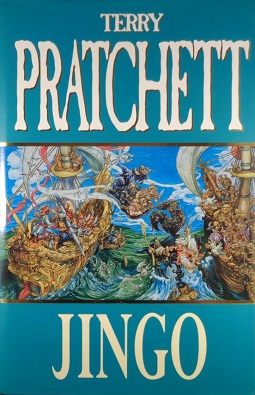Jingo (novel)

Advertisements stated "The Discworld has come of age"
|
|
| Author | Terry Pratchett |
|---|---|
| Language | English |
| Series |
Discworld 21st novel – 4th City Watch story |
| Subject |
War, diplomacy, jingoism, racism and xenophobia
|
| Genre | Fantasy |
| Publisher | Victor Gollancz |
|
Publication date
|
1997 |
| ISBN | (hardcover) |
War, diplomacy, jingoism, racism and xenophobia
Jingo is the 21st novel by Terry Pratchett, one of his Discworld series. It was published in 1997. The rising of a previously submerged island and the subconstituent sovereignty dispute were inspired by the real-life island of Ferdinandea.
With the opening of the novel, the island of Leshp, which had been submerged under the Circle Sea for centuries, rises to the surface. Its position, exactly halfway between Ankh-Morpork and Al Khali (the capital of Klatch), makes the island a powerful strategical point for whoever lays claim to it, which both cities do.
In Ankh-Morpork, a Klatchian Prince named Khufurah is parading through Ankh-Morpork, where he will be presented with a Degree in Sweet Fanny Adams (Doctorum Adamus cum Flabello Dulci), but an assassination attempt occurs, and the Prince is wounded. Sir Samuel Vimes, Commander of the Ankh-Morpork City Watch, begins investigating the crime, originally suspecting both a Klatchian named 71-Hour Ahmed and a senior Morporkian , Lord Rust, of being involved.
The attempted assassination breaks off relations between Ankh-Morpork and Klatch as Prince Khufurah's brother, Prince Cadram, effectively declares war on the city of Ankh-Morpork. At this point, Havelock Vetinari, Patrician of Ankh-Morpork, resigns—apparently of his own free will—and Lord Rust takes command of the city. Vetinari has refused to become involved in the war with Klatch, due to the fact Ankh-Morpork does not have an army to stand against any opposing forces (the reason given being that killing enemy soldiers makes it difficult to sell them things afterwards), but Rust declares Martial law and orders the city's noble families to revive their old private regiments.
...
Wikipedia
